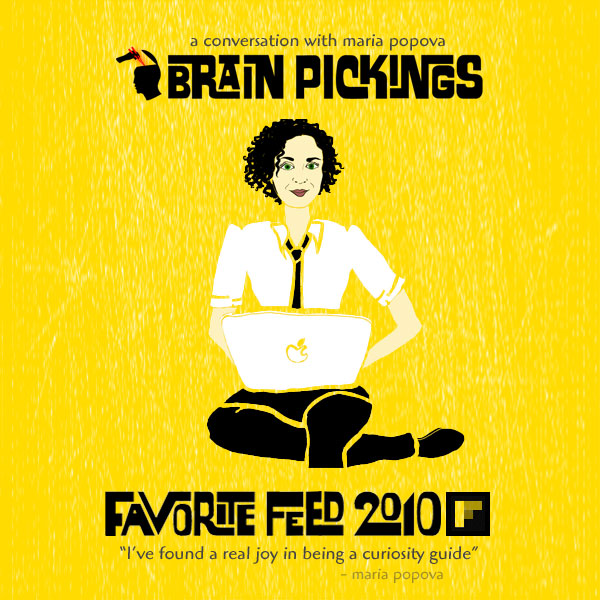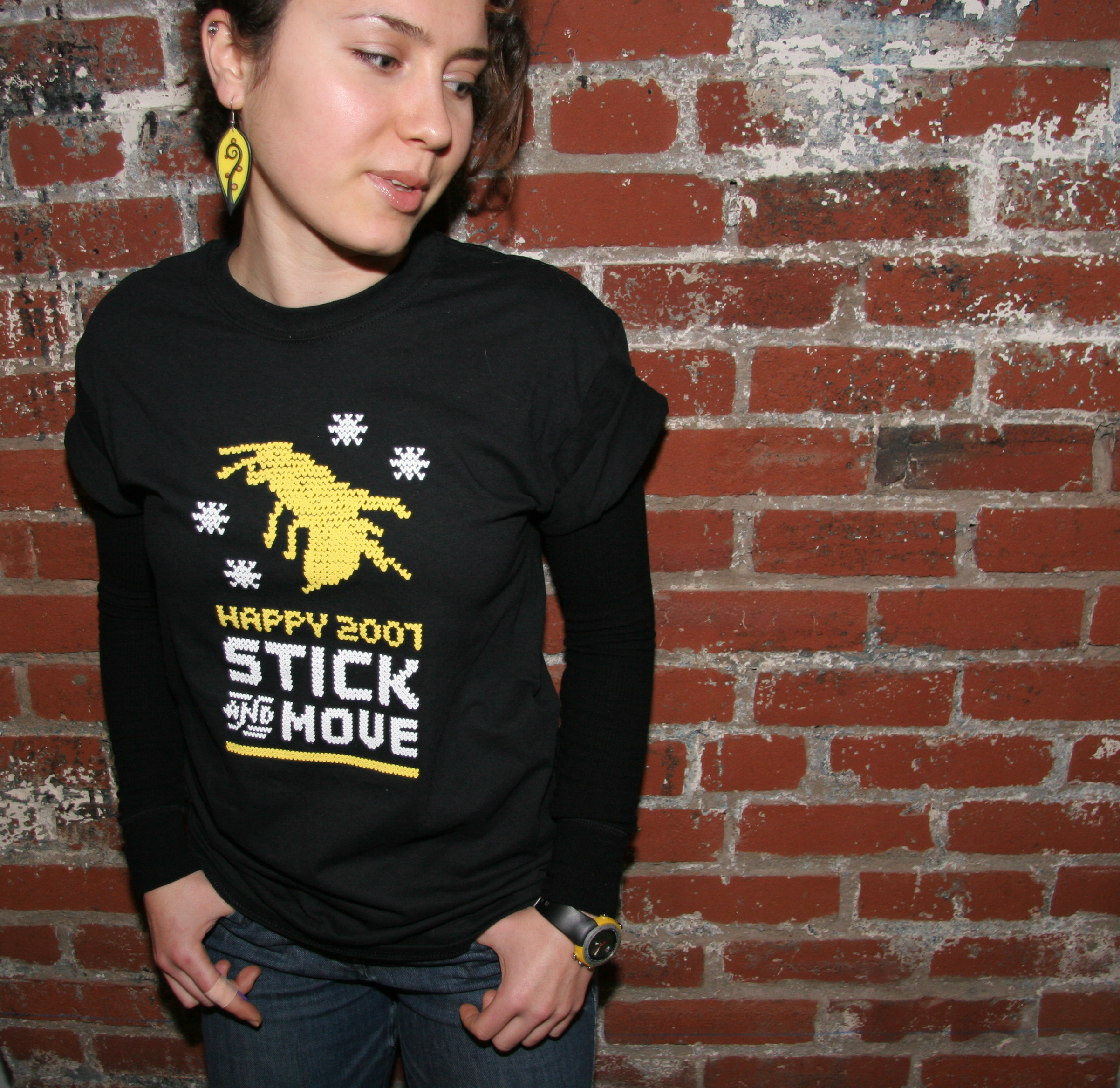 As we wrap up a fantastic 2010, we decided we wanted to select some of our favorite feeds here at Flipboard. It’s been a tricky process because we’re all a team of people who don’t like to play favorites. We just like a lot of different things and our interests are all over the map. This is why we’re all so excited about building something like Flipboard.
As we wrap up a fantastic 2010, we decided we wanted to select some of our favorite feeds here at Flipboard. It’s been a tricky process because we’re all a team of people who don’t like to play favorites. We just like a lot of different things and our interests are all over the map. This is why we’re all so excited about building something like Flipboard.
That’s why we chose Maria Popova’s Brain Pickings feed for our Most Favorite Feed of the Year because she is most like us. She understands that there is this fantastic ocean of information at all of our fingertips these days. She also knows there is too much information and there is a need for people to collect and collate this information to give it relevance, to reveal new patterns and give it context that others might not see. It’s the art of taking information and turning it into knowledge and even wisdom.
So, we wanted to find out a bit more about her and share some of her perspective with you. We wanted to pick her brain a little bit more, if you will. Enjoy.
Thanks for taking the time to do this interview with us. Please tell our readers a little about your personal background. Where are you from and how has your life and career evolved to bring you to where you are now? Maria Popova: I’m originally from Bulgaria. I moved to the states in 2003 to go to college at UPenn, studying communication and consumer psychology. I was working three jobs at the time, to pay for school, one of which was in a wonderfully creative startup environment. That’s when I started Brain Pickings – partly as a creative aid for our team, and partly as a way to scratch my own itch for writing and quench my restless curiosity. Eventually, Brain Pickings led to various writing gigs with Wired UK, Design Observer, GOOD and a handful of other publications that I now write for, as well as my “day job” as Insight Patternist at TBWA Worldwide.
MP: As I mentioned, it began as a creativity crutch – I was working at a startup ad agency and noticed everything the creative team circulated for inspiration came from within the ad industry: Design annuals, viral videos by other agencies, cool commercials. And I thought there was an enormous disconnect between the contention of being in the “creative industry” and the tendency to limit curiosity to everything that’s already been done in that same field. So I started a simple weekly newsletter – every Friday, I would send out five links to five interesting things from disciplines other than advertising. Anything from an obscure Japanese short film to type design from the 1930s to the latest neuroscience breakthrough. Then, to my surprise, I noticed the guys were forwarding these emails to friends across wildly different industries – other creatives, but also lawyers, athletes, artists, wrtiers. I realized there was a unique intellectual market for this kind of indiscriminate, cross-disciplinary curiosity as a toolkit for creativity. So I decided to take it online, help it find a bigger audience. But the agency was a startup, so they couldn’t allocate a designer and developer to help me out. So I did the obvious thing: On top of working three jobs and a full Ivy League course load, I took a night class, buried myself in tutorials, and learned web designed, then built a WordPress theme and off it went. I started publishing, one curated item per day Monday through Friday, without much of a strategy, just pursuing my own curiosity and digging for nuggets of stuff that inspires, that gives you pause, that makes you connect dots you didn’t realize were connectable. Over time, it just found its audience. Its founding principle remains the same – the belief that our creativity is merely our ability to combine different pieces of knowledge, memory, ideas, inspiration and other bits from our mental reservoir into remarkable new thoughts, new ideas, new creations. I see my role as content curator as a curiosity guide and enabler of this combinatorial creativity.
MP: Thank you, you’re too kind. Curation, to me, is just a fancy buzzword for what I believe to be fundamental human wiring: To be indiscriminately curious and gravitate to the interesting, the compelling, the meaningful. I think “social curation” is a bit of an oxymoron, actually. Curation, by definition, requires a singular point of view, a curiosity sherpa who guides the audience on the journey of interestingness discovery. I don’t really have a strategy for curation, other than pursuing what excites me and inspires me. I like looking for patterns across different disciplines, different formats, different time periods – I think patterns are fundamental to the human brain and to how we make sense of the world. When I watch the latest OK Go video, I want to trace back the history of the Rube Goldberg machine as a storytelling device. I’m fascinated by how different schools of thought define what it means to be human. Or what 70 years of psych experiments can teach us about eradicating cyberbullying and fostering LGBT equality today. So I consume a lot of information across an incredibly wide spectrum of disciplines and sources, always aiming to synthesize the meaningful and connect it with something else for a larger portrait of what matters in the world.

MP: I’ve always been curious, but the social web has been a great enabler. We take it for granted, but it’s absolutely amazing just how much information, history and human knowledge is at our digitally enhanced fingertips today. Somewhere between our brains’ natural hunger for knowledge and the immense, overwhelming information landscape of today lies a real opportunity for growth, but it’s contingent upon the kind of guidance we get in navigating this boon of information. I’ve found a real joy in being a curiosity guide, both for myself and for others.
MP: Depends on how we define value. For me, valuable is anything that gives you pause and leaves you with something – knowledge, inspiration, a question – after you close the browser tab or flip the page. The more cross-disciplinary, the more patterns it reveals, the more valuable. I think, above all, the true value of curation is guiding people to what they’re interested in even before they knew they were interested in it. The word “effective” always unsettles me when it comes to publishing because I know it tends to refer to traffic and SEO strategies. I really don’t care for this game. Linkbait titles, list articles with no editorial depth, truncated RSS feeds, URL shorteners with forced toolbars – that’s not really my thing and, as a reader, I get increasingly annoyed when publishers put their traffic numbers first and their audience’s reading experience second. So I try not to do it. What’s “effective” is what’s valuable and compelling for my readers. Some time ago, an artist emailed me to say he had stopped painting several years ago. He had discovered Brain Pickings a few months earlier and was now writing to say he was back in the studio for the first time, thanking me for the intellectual and creative stimulation. A few months later he sent me photos from his first gallery show in a decade. That is “effective” in my book.
What has been the most surprising part of running the site? Have any particular posts surprised you the most in how people have reacted to them?
MP: I think most surprising of all has been the incredible loyalty and support from my readers. Brain Pickings grows, it’s becoming increasingly expensive to run – it’s a Catch-22 I’m thankful to have, but pragmatically frustrating nonetheless. I’ve been, perhaps foolishly, very stubborn and refused to take regular advertising. (The banners on the site are mostly pro-bono for causes, nonprofits and social-good companies I’d like to support and help by giving them share of voice.) So Brain Pickings is funded almost entirely through reader donations, which have been so generous and humbling. The best part: People often leave me little notes in the Comments section on PayPal, as they make their donation, which are just so soul-warming. I’m incredibly grateful for this support.
MP: I’ve gotten some wonderful comments on Twitter. I tend to share a lot of visual content – design, photography, vintage graphics – and readers have really been enjoying the gorgeous, immersive experience Flipboard creates out of drab links. I also get quite a few notes from people saying they discovered me through Flipboard and now read Brain Pickings regularly. So thank you for that!
MP: People organically engage with content and pursue their curiosity across many different platforms. I’d like to follow them there. The site is just one, Twitter another, but there’s so much more. From a series of coffeetable books to a podcast to offline speaker series and workshops, this direction of cross-platform publishing is something I’ve been toying with lately and have a couple of project in the pipeline. Stay tuned!
MP: Thank YOU, both for the humbling vote of confidence and for building something I believe to be, completely independently from my being a featured user, a true next frontier of how we engage with content and explore our curiosity. We hope you’ve enjoyed the interview with Maria Popova. Thanks for reading,
~ JonV community@flipboard.com facebook.com/flipboard @flipboardCM

